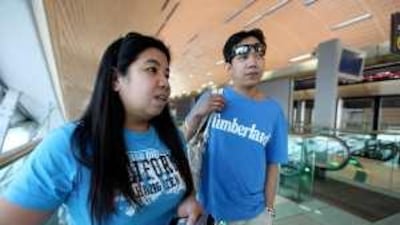DUBAI // For some it was just the opening of seven new Metro stations. But for many residents of Al Karama, which boasts one of those seven, it was the day, they say, that opened up a city for them. The area of Bur Dubai is home mainly to low-income and middle-income people from India, Pakistan and the Philippines. Individual apartments are rare and largely unaffordable to most residents. Jonas Ramos, 25, a data specialist from the Philippines, who shares a flat five minutes from the station with two other friends, will be commuting by Metro to his work in Media City.
Not only was the Metro now a means of travelling cheaply to work, but it had, Mr Ramos said, provided him with a way of familiarising himself with the city in which he has lived for three years. A one-way Metro ticket to Media City costs Dh4.10 (US$1.10); the same journey in a taxi would cost around Dh50. "With more stations opening, especially with one just outside my home, I can now afford to explore the city," he said.
Before the station's opening, Mr Ramos and his friends spent most of their free time in Al Karama, but this is likely to change. "I will be going more places with the Metro. I can go all the way to Ibn Battuta," he said. Mary Jane Aratan, 31, an assistant accountant, and her husband, Jhay Fortes, 29, an IT specialist, are both from the Philippines but live at opposite ends of Dubai because their respective companies provide them with accommodation.
They meet only on the weekend, and the Metro is their means of transportation. Yesterday, they took the train to visit a friend in Al Karama, who was celebrating his birthday. Ms Aratan said: "We did not even know that the new stations had opened so we took the train from the Nakheel Harbour and Tower station and had intended to get to Khalid Bin al Waleed station and take a taxi from there, but it was a happy surprise to be able to come down in Al Karama station, which is five minutes' walk from our friend's house."
They said the hot weather might deter some people from walking to Metro stations during the summer. But for Ms Aratan and her husband, who said they earned Dh6,500 a month between them, this will not happen. "The hot weather might put off those who have bigger salaries, but for us it is better to walk than spend money we do not have," Ms Aratan said. The couple said that, as more stations open, they will be able to save about 80 per cent of what they used to pay for travel. They said that they usually needed to spend about Dh50 every time they met.
Ms Aratan said: "I think that the Metro, especially after the new stations, will bring the city closer and more people from different areas in the city will be encouraged to visit each others' areas." For some, however, the Metro is more a recreation option than a lifestyle choice. Such is the case for Noushad PN and his family, who have lived in Al Karama for 21 years. "I wanted my two children and my wife to go on a ride on the first day of the opening of Al Karama station," said Mr Noushad, who took his family on the first train from Al Karama to Jebel Ali and back.
His eight-year-old son, Nafieh, declared: "I prefer to go by Metro than by car because it is more fun." @Email:wissa@thenational.ae

